Men who have sex with men (MSM), also known as males who have sex with males, are male persons who engage in sexual activity with members of the same sex, regardless of how they identify themselves. They may identify as gay, homosexual, bisexual, pansexual, or heterosexual; or dispense with sexual identification altogether.
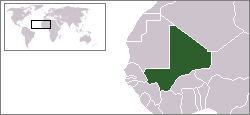
Lesbian, gay, bisexual, and transgender (LGBT) persons in Mali may face legal challenges not experienced by non-LGBT residents. LGBT persons face stigmatization among the broader population. According to the 2007 Pew Global Attitudes Project, 98 percent of Malian adults believe that homosexuality is a way of life that society should not accept, which was the highest rate of non-acceptance in the 45 countries surveyed.
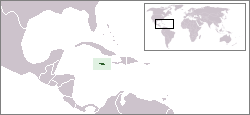
Lesbian, gay, bisexual, and transgender (LGBT) persons in Jamaica face legal and social issues not experienced by non-LGBT people. Sexual intercourse between same-sex partners is legally punishable by imprisonment, torture, vigilante executions, and vigilante beatings.
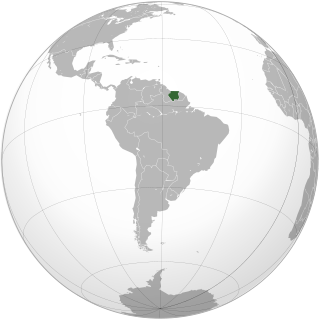
Lesbian, gay, bisexual, and transgender (LGBT) people in Suriname may face legal challenges not experienced by non-LGBT residents. Both male and female same-sex sexual activity are legal in Suriname. Since 2015, hate speech and discrimination in employment and the provision of goods and services on the basis of sexual orientation has been banned in the country. Same-sex marriage and civil unions are not recognised by law. Nevertheless, Suriname is legally bound to the January 2018 Inter-American Court of Human Rights ruling, which held that same-sex marriage is a human right protected by the American Convention on Human Rights.
Joël Gustave Nana Ngongang (1982–2015), frequently known as Joel Nana, was a leading African LGBT human rights advocate and HIV/AIDS activist. Nana's career as a human rights advocate spanned numerous African countries, including Nigeria, Senegal and South Africa, in addition to his native Cameroon. Was the Chief Executive Officer of Partners for Rights and Development (Paridev) a boutique consulting firm on human rights, development and health in Africa at the time of his death. Prior to that position, he was the founding Executive Director of the African Men for Sexual Health and Rights (AMSHeR)an African thought and led coalition of LGBT/MSM organizations working to address the vulnerability of MSM to HIV, Mr Nana worked in various national and international organizations, including the Africa Research and Policy Associate at the International Gay and Lesbian Human Rights Commission(IGLHRC), as a Fellow at Behind the Mask, a Johannesburg-based non-profit media organisation publishing a news website concerning gay and lesbian affairs in Africa, he wrote on numerous topics in the area of African LGBT and HIV/AIDS issues and was a frequent media commentator. Nana on died on October 15, 2015 after a brief illness.

Lesbian, gay, bisexual and transgender (LGBT) rights are heavily suppressed in Bangladesh. Due to the conservative mentality of Bangladeshi society, negative attitudes towards homosexuals are very high. Homosexuality is illegal under Bangladeshi law, which is inherited from the British Indian Government's Section 377 of 1860. According to the law, the punishment for doing homosexual activities is imprisonment, therefore it is dangerous for those who identify as homosexuals to openly come out in society because of social rejection, hate or assault.
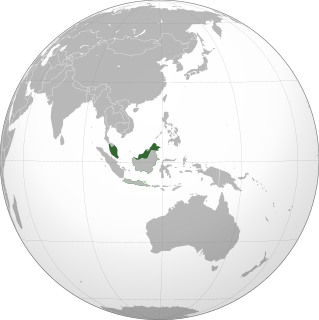
Lesbian, gay, bisexual, and transgender (LGBT) people in Malaysia face significant challenges not experienced by non-LGBT residents. Sodomy is a crime in the country, with laws strictly enforced, and social attitudes towards the LGBT community are shaped by Islam, the official state religion of Malaysia. Breaking the law is punishable by up to 20 years in prison and authorities will also bring the person to corporal punishment (caning).
Many countries have laws, regulations, or recommendations that effectively prohibit donations of blood or tissue for organ and corneal transplants from men who have sex with men (MSM), a classification of males who engage or have engaged in sex with other males, irrespective of their sexual activities with same-sex partners and of whether they identify themselves as bisexual or gay. Temporary restrictions are sometimes called "deferrals", since blood donors who are found ineligible may be found eligible at a later date. However, many deferrals are indefinite meaning that donation are not accepted at any point in the future, constituting a de facto ban. Even men who have monogamous relations with their same-sex partner are found ineligible.

Lesbian, gay, bisexual, and transgender (LGBT) persons in Zambia face legal challenges not faced by non-LGBT citizens. Same-sex sexual activity is illegal for both males and females in Zambia. Formerly a colony of the British Empire, Zambia inherited the laws and legal system of its colonial occupiers upon independence in 1964. Laws concerning homosexuality have largely remained unchanged since then, and homosexuality is covered by sodomy laws that also proscribe bestiality. Social attitudes toward LGBT people are mostly negative and coloured by perceptions that homosexuality is immoral and a form of insanity.

Timeline of events related to sexual orientation and medicine

Bisi Alimi is a Nigerian gay rights activist, public speaker, blog writer and HIV/LGBT advocate who gained international attention when he became the first Nigerian to come out on television.

Lesbian, gay, bisexual and transgender (LGBT) people in Liberia face legal and social challenges others in the country do not experience. LGBT people in Liberia encounter widespread discrimination, including harassment, death threats, and at times physical attacks. Several prominent Liberian politicians and organizations have campaigned to restrict LGBT rights further, while several local, Liberian-based organizations exist to advocate and provide services for the LGBT community in Liberia. Same-sex sexual activity is criminalized regardless of the gender of those involved, with a maximum penalty of one year in prison, and same-sex marriage is illegal.
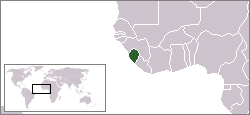
Lesbian, gay, bisexual, and transgender (LGBT) persons in Sierra Leone face legal challenges not experienced by non-LGBT residents. Male same-sex sexual activity is illegal in Sierra Leone and carries a possible penalty of life imprisonment, although this law is seldom enforced.
The Naz Foundation (India) Trust is a non-governmental organisation (NGO) in that country that works on HIV/AIDS and sexual health. It is based in the Indian capital of New Delhi.
Discrimination against people with HIV/AIDS or serophobia is the prejudice, fear, rejection, and stigmatization of people with HIV/AIDS. Marginalized, at-risk groups such as members of the LGBTQ+ community, intravenous drug users, and sex workers are most vulnerable to facing HIV/AIDS discrimination. The consequences of societal stigma against PLHIV are quite severe, as HIV/AIDS discrimination actively hinders access to HIV/AIDS screening and care around the world. Moreover, these negative stigmas become used against members of the LGBTQ+ community in the form of stereotypes held by physicians.
Since reports of the Human Immunodeficiency Virus (HIV) began to emerge and spread in the United States between the 1970s and 1980s, the HIV/AIDS epidemic has frequently been linked to gay, bisexual, and other men who have sex with men (MSM) by epidemiologists and medical professionals. It was first noticed after doctors discovered clusters of Kaposi's sarcoma and pneumocystis pneumonia in homosexual men in Los Angeles, New York City, and San Francisco in 1981. The first official report on the virus was published by the Center for Disease Control (CDC) on June 5, 1981 and detailed the cases of five young gay men who were hospitalized with serious infections. A month later, The New York Times reported that 41 homosexuals had been diagnosed with Kaposi's sarcoma, and eight had died less than 24 months after the diagnosis was made. By 1982, the condition was referred to in the medical community as "gay-related immune deficiency" (GRID), "gay cancer," and "gay compromise syndrome". It was not until July 1982 that the term Acquired Immune Deficiency Syndrome (AIDS) was suggested to replace GRID, and even then it was not until September that the CDC first used the AIDS acronym in an official report.
galck+ formerly The Gay and Lesbian Coalition of Kenya (GALCK) is the National SOGIE umbrella body, representing LGBTQ+ voices across Kenya.

Gay sexual practices are sexual activities involving men who have sex with men (MSM), regardless of their sexual orientation or sexual identity. These practices can include anal sex, non-penetrative sex, and oral sex. Evidence shows that sex between men is significantly underreported in surveys due to social desirability bias. Some or all sexual activity between men are currently or formerly classified as crimes in some jurisdictions.

Dr. Robert Carr was a Trinidadian scholar and human rights activist who dedicated his life to bringing public attention to issues related to stigma and discrimination against persons living with or affected by HIV/AIDS.
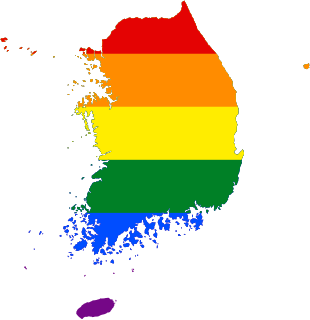
The health access and health vulnerabilities experienced by the lesbian, gay, bisexual, transgender, queer or questioning, intersex (LGBTQI) community in South Korea are influenced by the state's continuous failure to pass anti-discrimination laws that prohibit discrimination based on sexual orientation and gender identity. The construction and reinforcement of the South Korean national subject, "kungmin," and the basis of Confucianism and Christianity perpetuates heteronormativity, homophobia, discrimination, and harassment towards the LGBTQI community. The minority stress model can be used to explain the consequences of daily social stressors, like prejudice and discrimination, that sexual minorities face that result in a hostile social environment. Exposure to a hostile environment can lead to health disparities within the LGBTQI community, like higher rates of depression, suicide, suicide ideation, and health risk behavior. Korean public opinion and acceptance of the LGBTQI community have improved over the past two decades, but change has been slow, considering the increased opposition from Christian activist groups. In South Korea, obstacles to LGBTQI healthcare are characterized by discrimination, a lack of medical professionals and medical facilities trained to care for LGBTQI individuals, a lack of legal protection and regulation from governmental entities, and the lack of medical care coverage to provide for the health care needs of LGBTQI individuals. The presence of Korean LGBTQI organizations is a response to the lack of access to healthcare and human rights protection in South Korea. It is also important to note that research that focuses on Korean LGBTQI health access and vulnerabilities is limited in quantity and quality as pushback from the public and government continues.













